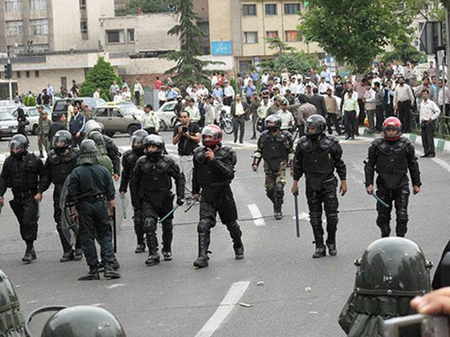
Iran’s Supreme Leader Ali Khamenei has attempted to quell the uprising of the Iranian people and obscure his regime’s internal conflicts by leveraging the ongoing war in Gaza.
His strategy also aimed to influence the outcomes of the forthcoming parliamentary and Assembly of Experts elections. However, after more than 70 days of war, the regime’s deep-seated issues have resurfaced, challenging its stability.
A recent article in the state-run Shargh newspaper, titled “The Government-People Divide from the Perspective of Friday Prayer preachers,” sheds light on the myriad difficulties faced by Iranian society. The newspaper outlines various societal concerns, including bankrupt pension funds, privatization challenges, air pollution, major city closures in Tehran and Isfahan, rising retirement ages, financial embezzlement, government corruption, a staggering 49% increase in taxes, inflation, high prices, and the use of Mazut as fuel. These issues are not only prominent in the digital space but also dominate the headlines of major Iranian newspapers, reflecting the gravity of the situation.
For instance, in Isfahan, Yousef Tabatabainejad, who resumed his Friday sermons after an 18-month hiatus due to illness, initially discussed Palestine and regional issues. He then stressed the importance of participation in the upcoming parliamentary elections, making him the only preacher to acknowledge the issue of high prices, albeit defending the government’s role. His sermon concluded with a call for the people to reflect on their contributions to the revolution, rather than questioning what the revolution has done for them.

Shargh newspaper also highlights a worrying silence among Tehran and Isfahan’s Friday Prayer preachers regarding pressing issues like air pollution, which has led to city closures.
This silence, juxtaposed with their ignorance of the billion-dollar corruption scandal in the tea industry, suggests a deeper alignment with the regime’s concerns, as all Friday Prayer leaders are appointed by the regime. A former parliament member candidly spoke about the regime’s efforts to cover up internal crises and corruption, emphasizing the lack of discourse on embezzlement issues, even among those who occupy influential positions and claim allegiance to the revolution.
The scandal known as the “Tea corruption,” dubbed the largest economic corruption in Iran’s history by the regime itself, has significantly weakened Khamenei’s position, putting him on the defensive. This incident exemplifies the intertwined nature of corruption, crime, and warmongering that characterizes the rule of the mullahs in Iran. The article concludes with a strong message: the only path to eradicating this regime’s corruption lies in an uprising by the Iranian people and their organized resistance, signaling a critical juncture in Iran’s socio-political landscape.

MEK Iran (follow us on Twitter and Facebook), Maryam Rajavi’s on her site, Twitter & Facebook, NCRI (Twitter & Facebook), and People’s Mojahedin Organization of Iran – MEK IRAN – YouTu
